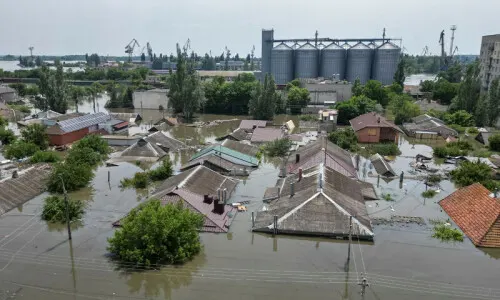Ukrainians abandoned their inundated homes as floodwaters crested across a swathe of the south on Wednesday after the destruction of a vast dam on the front line between Russian and Ukrainian forces that each blamed on the other.
Residents waded through flooded streets carrying children on their shoulders, dogs in their arms and belongings in plastic bags while rescuers used rubber boats to search areas where the waters reached above head height.
Ukraine said the flood would leave hundreds of thousands of people without access to drinking wa-ter, swamp tens of thousands of hectares of agricul-tural land and turn more into deserts.
“If the water rises for another metre, we will lose our house,” said Oleksandr Reva, in a village on the bank, who was moving his family’s belongings into the abandoned home of a neighbour on higher ground. A roof of a house could be seen being swept down the Dnipro River in a torrent.
The disaster at the Nova Kakhovka dam coin-cided with the apparent start of a long-awaited counteroffensive by Ukrainian forces, seen as the next major phase of the war.
Each side accused the other of continuing to shell across the flood zone and warned of drifting land-mines unearthed by the flooding.
Kyiv said on Wednesday its troops in the east had advanced by more than a kilometre around the ruined city of Bakhmut in eastern Ukraine, its most explicit claim of progress since Russia reported the start of the Ukrainian offensive this week. Russia said it had fought off the attack.
Residents in the flood zone in the country’s south blamed the bursting of the dam on Russian troops who controlled it from their positions on the opposite bank.
“They hate us,” Reva said. “They want to destroy a Ukrainian nation and Ukraine itself. And they don’t care by what means because nothing is sacred for them.”
Russia imposed a state of emergency in the parts of Kherson province it controls, where many towns and villages lie in lowlands below the dam. Residents there have told Reuters by telephone that Russian troops patrolling the streets in waders were threatening civilians who approached.
Ukraine expects the floodwaters will stop rising by the end of Wednesday after reaching around five metres overnight, presidential deputy chief Oleksiy Kuleba said.
Two thousand people had been evacuated so far from the Ukrainian-controlled part of the flood zone, and the water level had reached its highest level in 17 settlements with a combined population of 16,000 people.
“Everything is submerged in water, all the furni-ture, the fridge, food, all flowers, everything is floating. I do not know what to do,” said Oksana, 53, in the city of Kherson downriver from the destroyed dam.
Russia’s Tass state news agency said the water level could remain elevated in places for up to 10 days.
he vast Dnipro River that bisects Ukraine forms the front line across the south.
The huge reservoir behind the dam was one of Ukraine’s main geographic features, and its waters irrigated large parts of one of the world’s biggest grain exporting nations, including Crimea, seized by Russia in 2014.
“The sheer magnitude of the catastrophe will only become fully realised in the coming days,” United Nations (UN) aid chief Martin Griffiths told the Security Council.
Targeting dams in war is explicitly banned by the Geneva Conventions. Neither side has presented public evidence demonstrating who was to blame.
“The whole world will know about this Russian war crime,” Ukrainian President Volodymyr Zelen-skiy said in his nightly address, calling it “an envi-ronmental bomb of mass destruction”.
Kremlin spokesman Dmitry Peskov said on Tuesday Ukraine had sabotaged the dam to distract attention from a new counteroffensive he said was “faltering”.
Washington said it was still gathering evidence about who was to blame, but that Ukraine would have had no reason to inflict such devastation on itself.
“Why would Ukraine do this to its own territory and people, flood its land, force tens of thousands of people to leave their homes — it doesn’t make sense,” Deputy US Ambassador to the UN Robert Wood told reporters.
Even as the evacuation was under way, Russia shelled Ukrainian-held territory across the river. Cracks of incoming artillery sent people trying to flee running for cover in Kherson.
Reuters reporters heard four incoming artillery blasts near a residential neighbourhood where civil-ians were evacuating on Tuesday evening. The gov-ernor said one person was killed.
Russia said for its part that a Ukrainian drone had struck a town on the opposite bank during evacuations there and accused the Ukrainian side of continuing shelling despite the flooding.
The emptying reservoir supplies water that cools Europe’s biggest nuclear power plant at Zaporizhzhia upstream.
The UN nuclear watchdog said the plant should have enough water to cool its reactors for “some months” from a separate pond.—AFP










